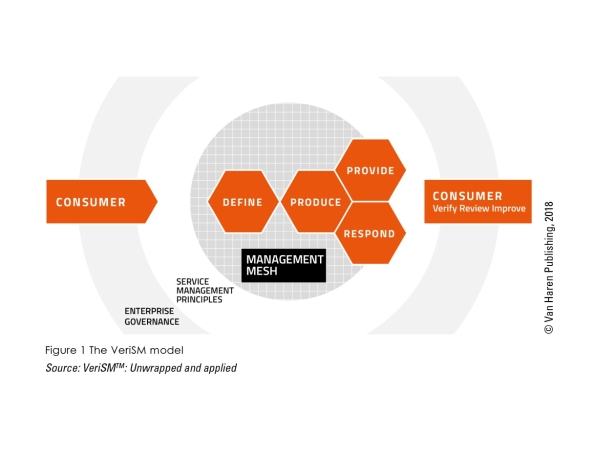

Service management is being transformed in the Digital Age. This is especially relevant in the case of IT Service Management.
We now have a vast array of technologies and resources that we use in our processes. Additionally, several management practices are being developed and combining all of this is always a challenge.
Therefore, having a responsive operational model is essential for companies that provide services/products. In fact, the VeriSM™ Model is the prime example of this type of operational model.
But what exactly is the VeriSM™ Model and how does it work? What is its importance for companies? That is what you will find out in this article!
What is the VeriSM™ Model?
The VeriSM™ Model is an operational standard for service management. Above all, it aims to create a detailed vision of how the company will deliver its strategy. This is to generate value for customers through its products and services.
The VeriSM™ acronym stands for:
- “V” Value-driven;
- “E” Evolving;
- “R” Responsive;
- “I” Integrated;
- “S” Service;
- “M” Management.
VeriSM™ is the newest conduct of good and best practices of ITSM (Information Technology Service Management).
This model is also known as “a new approach to service management for the Digital Age”. A slogan that makes perfect sense. VeriSM™ is specially adapted to support companies and help them succeed in the world of digital services.
Service management is approached from the organizational level as an end-to-end view. That is, it focuses not only on a single department.
One of the advantages of this model is that it shows how companies can adopt a series of management best practices that require flexibility. With VeriSM™, you don’t have to limit yourself to DevOps, Agile, Lean or any other practice. You can (and should) apply all those that are necessary for the company.
The VeriSM™ Model is always adaptable according to the size of the business. Therefore, it is important to emphasize that the organizational culture directly affects the implementation of the operational model. Its adaptation must keep up with the needs and transformations of the company.
How does VeriSM work?
VeriSM™ adopts a model as represented in the figure below:


Governance encompasses all activities, maintaining a strong focus on value, results, and business objectives.
The service management principles are part of governance and are defined for the company. These principles act as security guardians, ensuring that all products and services are aligned with the company’s needs.
The principles apply in several areas, including security, risk, quality, and asset use.
Then, it is communicated to all employees involved in development and operation.
It is important to highlight the unique element in the VeriSM™ Model, the Mesh Management. It includes:
- Resources;
- Environment;
- Emerging technologies;
- Management practices.
For each product or service, these four areas are considered.
For example, if a product requires development and operations to work more closely, mesh management will include DevOps as one of the management practices.
In addition, when we talk about developing and delivering a product or service, VeriSM divides this process into four stages:
Define
This stage occurs when a solution’s design is created. This solution is always based on prerequisites that involve Governance and Service Management Principles.
Produce
It involves the construction, testing, and deployment/validation of the solution. The solution is built from a Service Plan.
Provide
This is the VeriSM™ Model stage where day-to-day activities and marketing are included. These activities have only one objective: to ensure the functioning and more consumers of the product/service.
Respond
This activity addresses service issues, inquiries, and requests from consumers and non-consumers. It is extremely important, as it directly influences the consumer’s perception of the product/service.
Why adopt the VeriSM model?
Service management represents a provider’s ability to work integratedly with all its resources, delivering value and results in the form of a service.
Initially, companies have already realized that working with multiple practices is much more advantageous. VeriSM™ fills this gap. In other words, with it, the company has a broad view of how resources are being used and integrated, as well as the ability to choose the right management practices.
But of course, adopting VeriSM™ is not that simple. However, the model needs to be accompanied by organizational change management. This is not to mention support from senior management, engagement from everyone, and a change in organizational thinking and skills.
Therefore, with VeriSM™, all departments work towards one thing: providing quality service.

